Analyzing Change Management and Recommendations for ExxonMobil
VerifiedAdded on 2023/06/04
|15
|1064
|472
Report
AI Summary
This report provides an analysis of change management at ExxonMobil, focusing on the challenges the company faces in adapting to modern industry demands. It identifies issues such as bureaucracy, disregard for foreign policy, poor environmental management, and a weak organizational cultu...

Change Management at
ExxonMobil
Presented by
ExxonMobil
Presented by
Paraphrase This Document
Need a fresh take? Get an instant paraphrase of this document with our AI Paraphraser
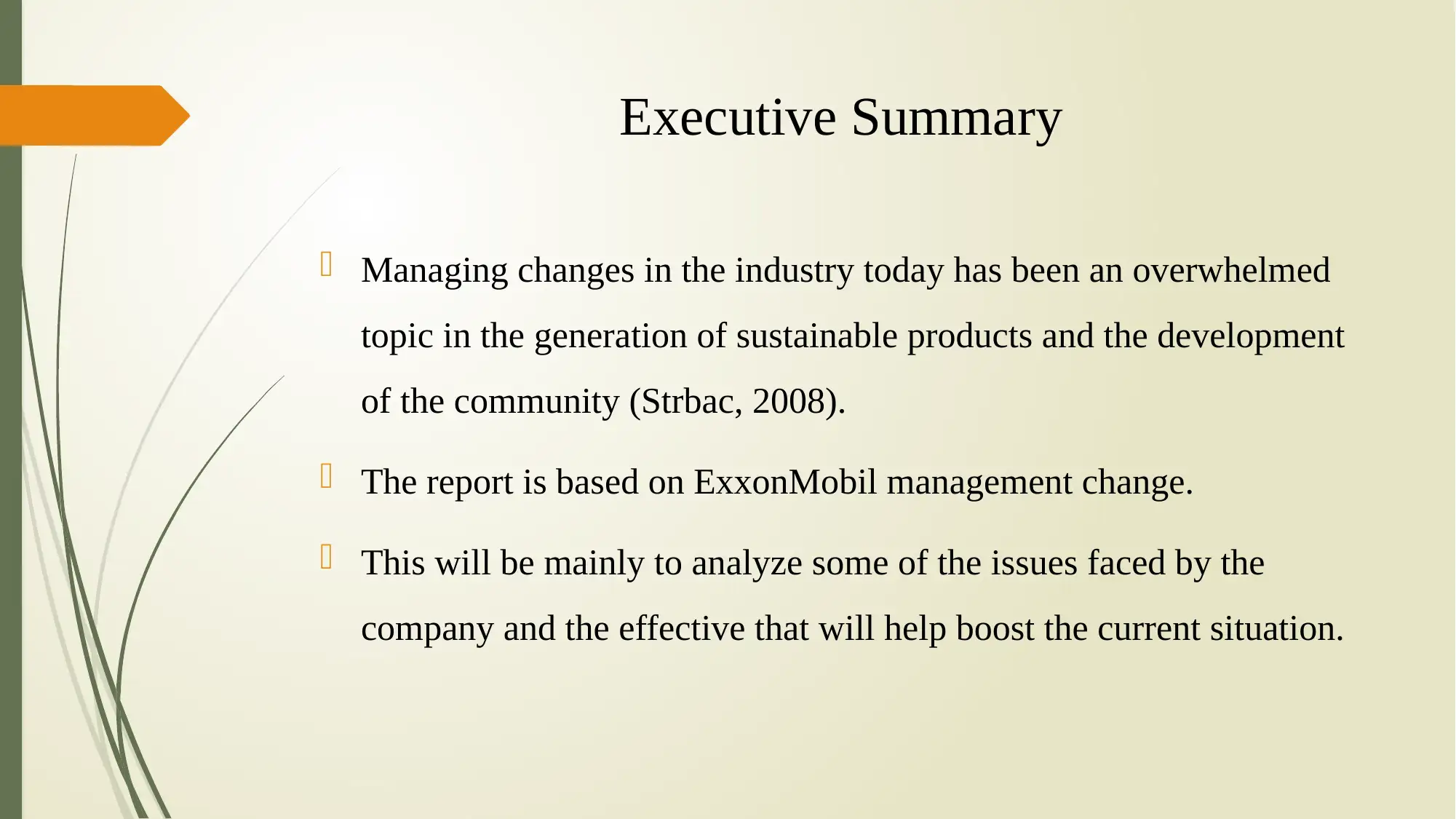
Executive Summary
Managing changes in the industry today has been an overwhelmed
topic in the generation of sustainable products and the development
of the community (Strbac, 2008).
The report is based on ExxonMobil management change.
This will be mainly to analyze some of the issues faced by the
company and the effective that will help boost the current situation.
Managing changes in the industry today has been an overwhelmed
topic in the generation of sustainable products and the development
of the community (Strbac, 2008).
The report is based on ExxonMobil management change.
This will be mainly to analyze some of the issues faced by the
company and the effective that will help boost the current situation.
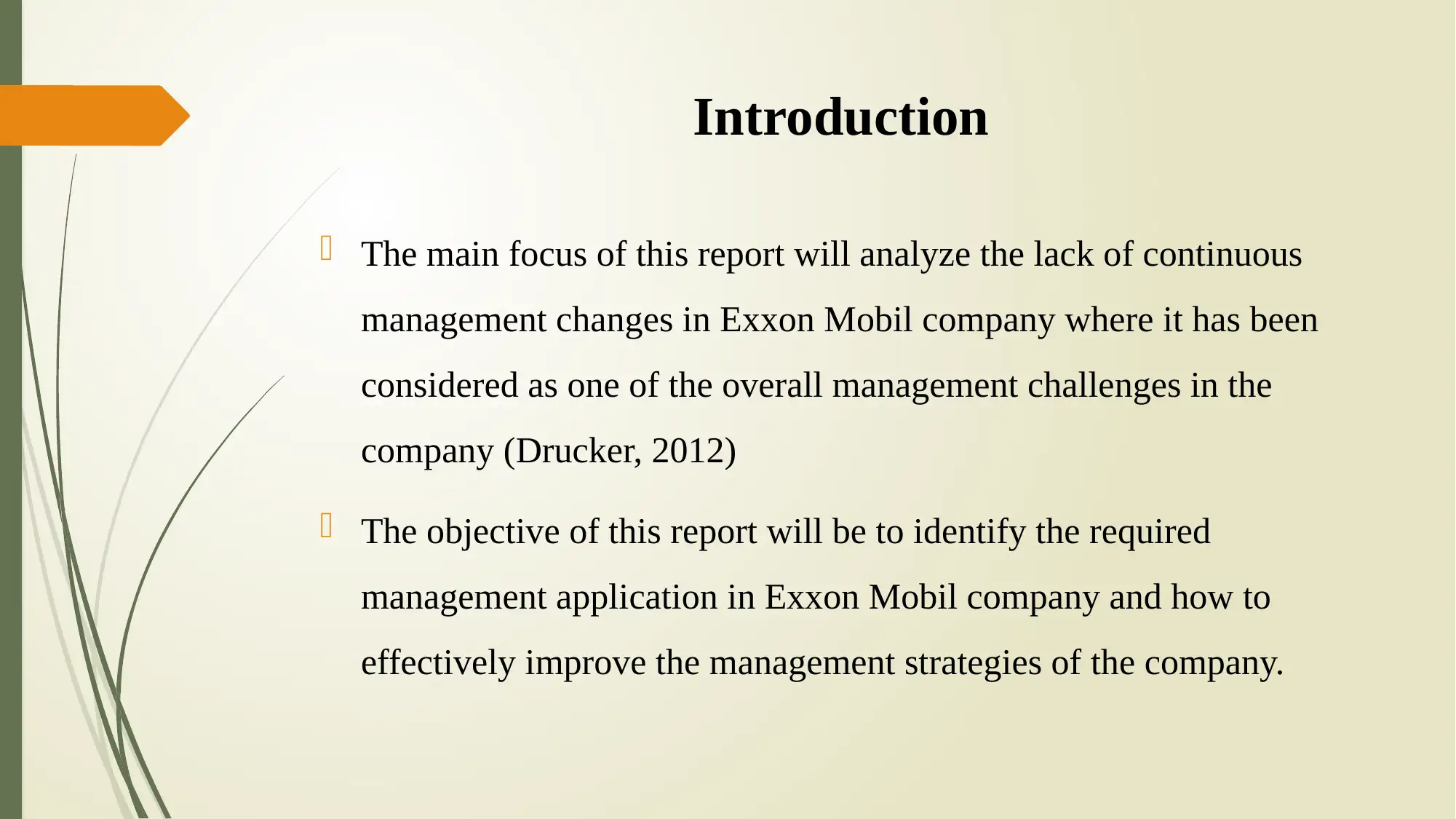
Introduction
The main focus of this report will analyze the lack of continuous
management changes in Exxon Mobil company where it has been
considered as one of the overall management challenges in the
company (Drucker, 2012)
The objective of this report will be to identify the required
management application in Exxon Mobil company and how to
effectively improve the management strategies of the company.
The main focus of this report will analyze the lack of continuous
management changes in Exxon Mobil company where it has been
considered as one of the overall management challenges in the
company (Drucker, 2012)
The objective of this report will be to identify the required
management application in Exxon Mobil company and how to
effectively improve the management strategies of the company.
⊘ This is a preview!⊘
Do you want full access?
Subscribe today to unlock all pages.

Trusted by 1+ million students worldwide
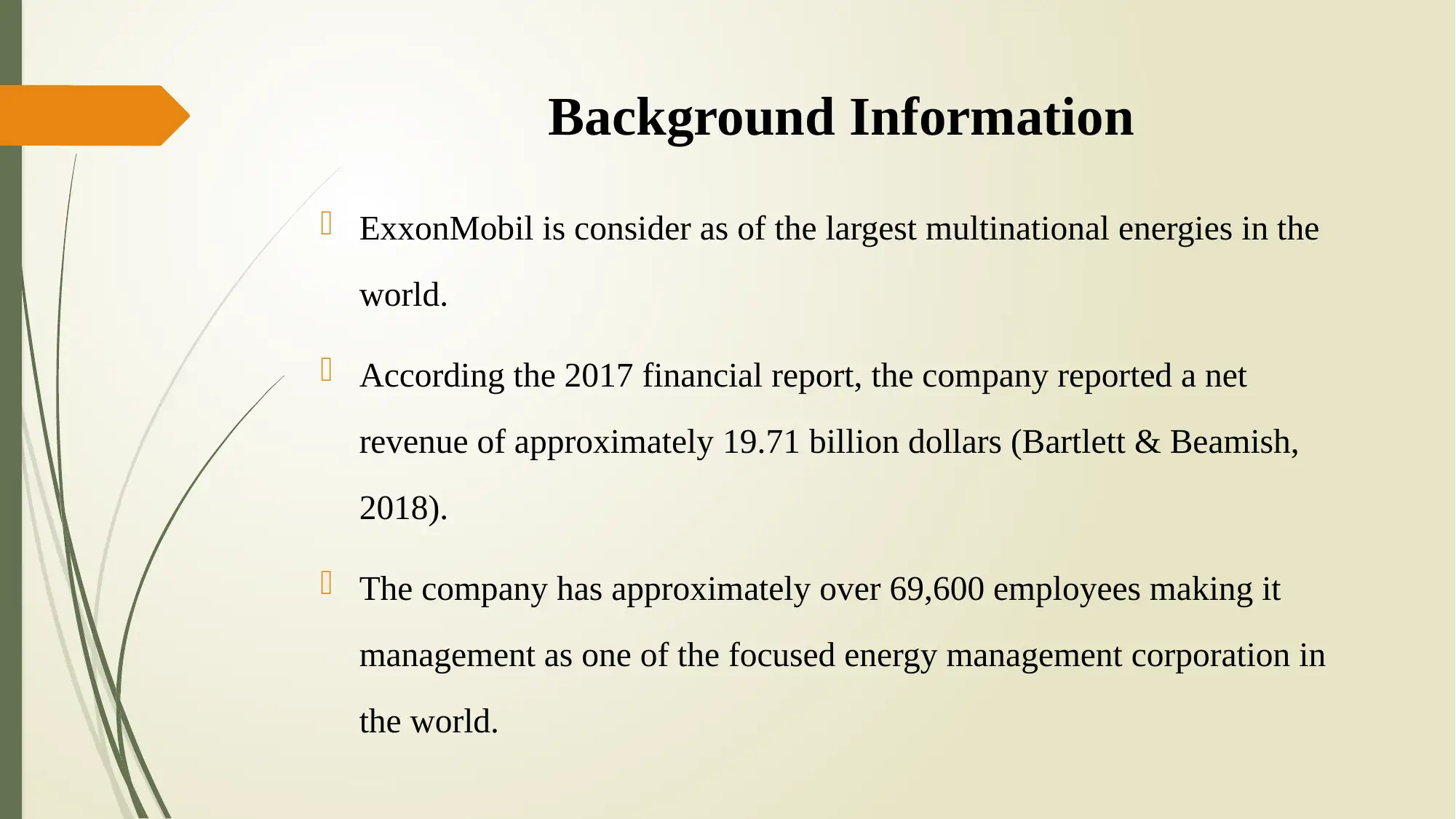
Background Information
ExxonMobil is consider as of the largest multinational energies in the
world.
According the 2017 financial report, the company reported a net
revenue of approximately 19.71 billion dollars (Bartlett & Beamish,
2018).
The company has approximately over 69,600 employees making it
management as one of the focused energy management corporation in
the world.
ExxonMobil is consider as of the largest multinational energies in the
world.
According the 2017 financial report, the company reported a net
revenue of approximately 19.71 billion dollars (Bartlett & Beamish,
2018).
The company has approximately over 69,600 employees making it
management as one of the focused energy management corporation in
the world.
Paraphrase This Document
Need a fresh take? Get an instant paraphrase of this document with our AI Paraphraser
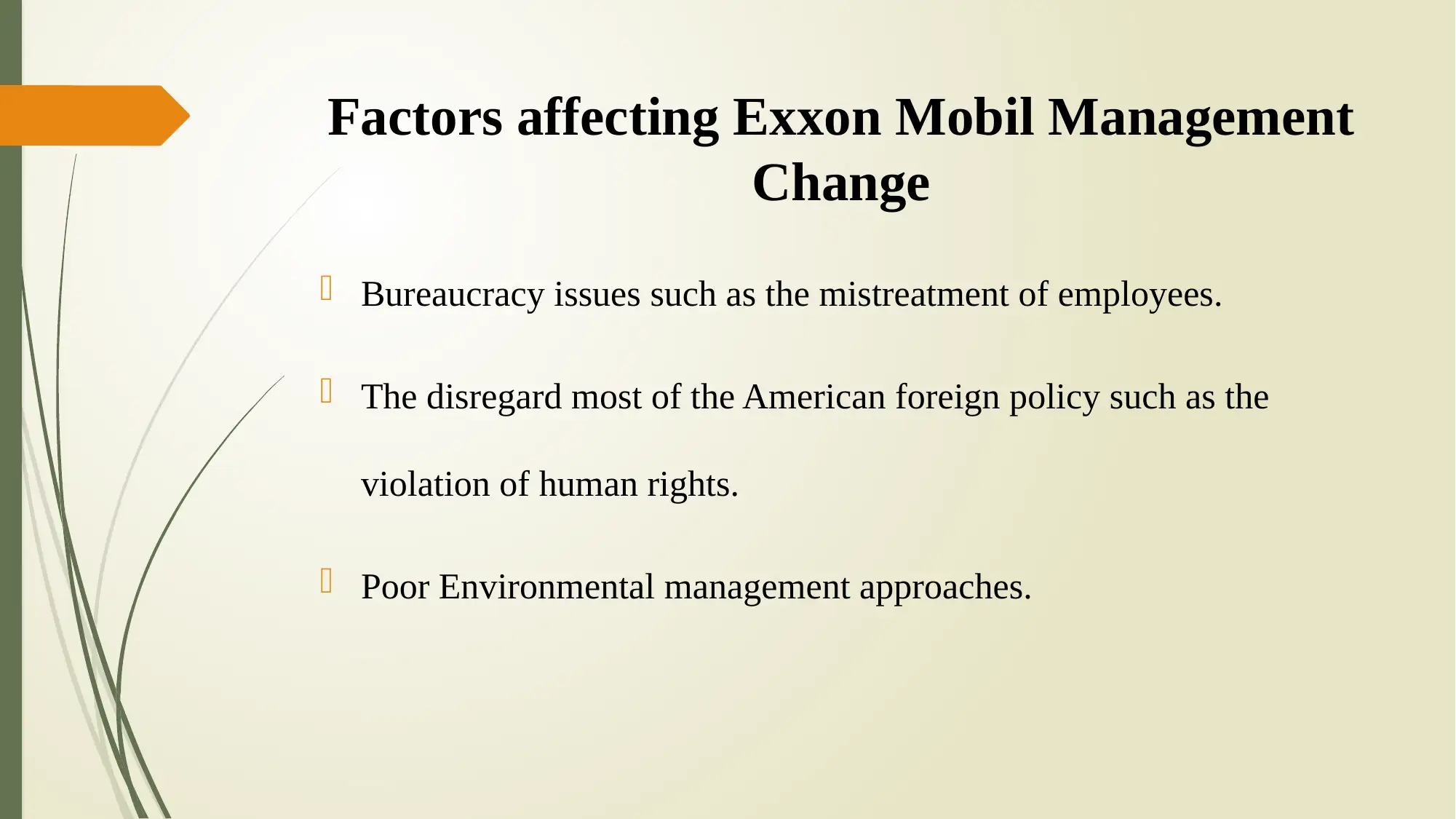
Factors affecting Exxon Mobil Management
Change
Bureaucracy issues such as the mistreatment of employees.
The disregard most of the American foreign policy such as the
violation of human rights.
Poor Environmental management approaches.
Change
Bureaucracy issues such as the mistreatment of employees.
The disregard most of the American foreign policy such as the
violation of human rights.
Poor Environmental management approaches.
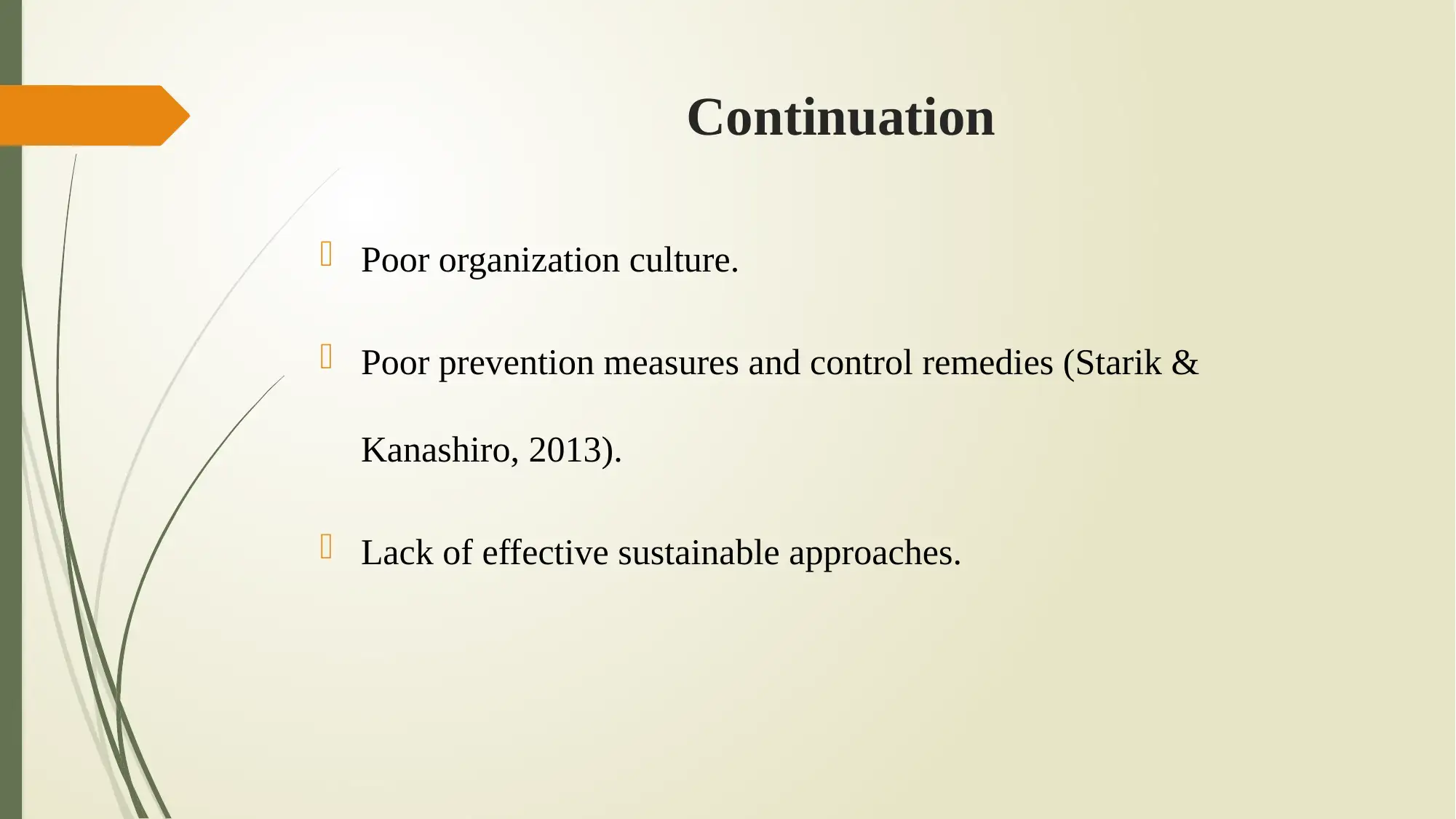
Continuation
Poor organization culture.
Poor prevention measures and control remedies (Starik &
Kanashiro, 2013).
Lack of effective sustainable approaches.
Poor organization culture.
Poor prevention measures and control remedies (Starik &
Kanashiro, 2013).
Lack of effective sustainable approaches.
⊘ This is a preview!⊘
Do you want full access?
Subscribe today to unlock all pages.

Trusted by 1+ million students worldwide
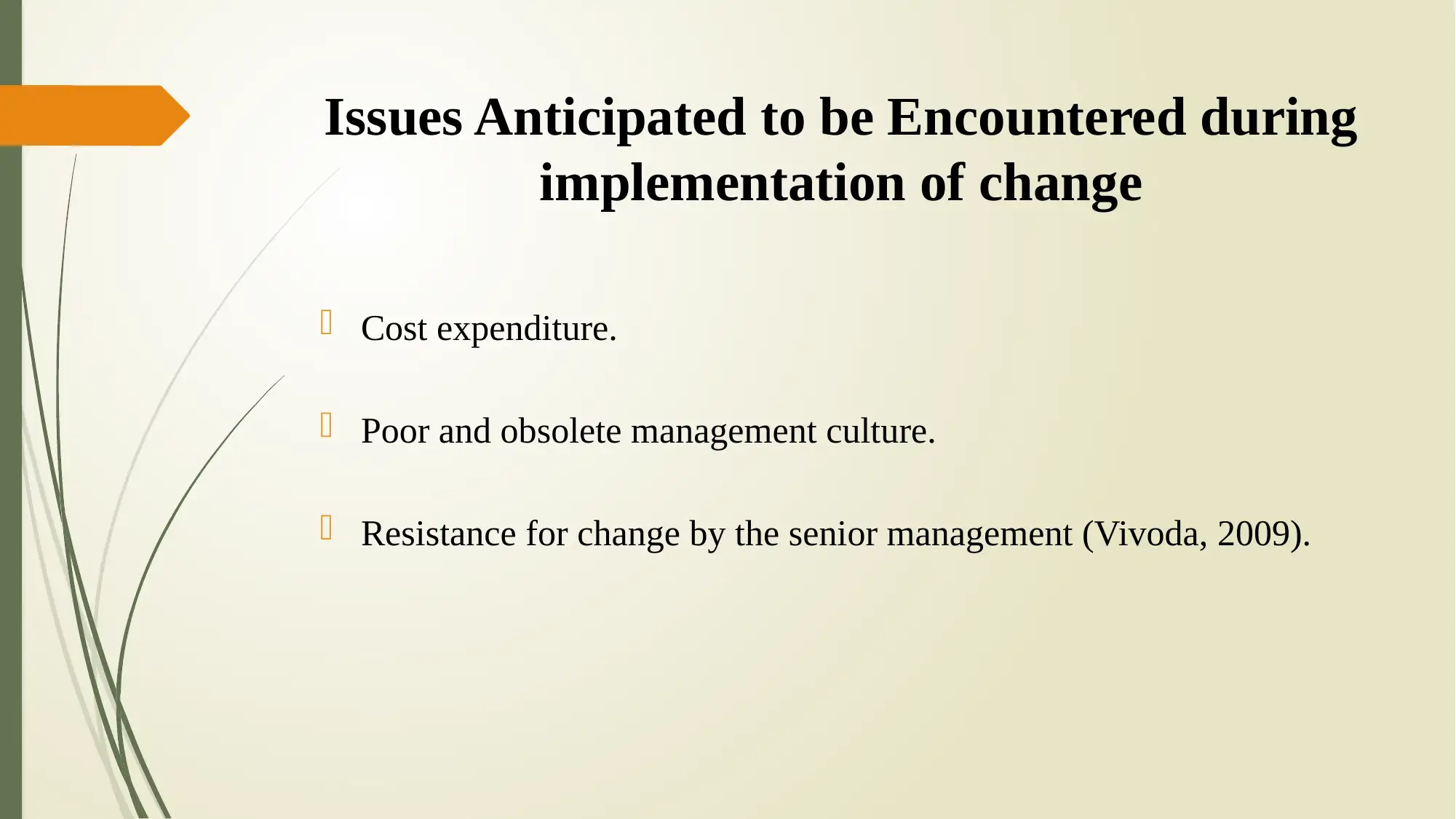
Issues Anticipated to be Encountered during
implementation of change
Cost expenditure.
Poor and obsolete management culture.
Resistance for change by the senior management (Vivoda, 2009).
implementation of change
Cost expenditure.
Poor and obsolete management culture.
Resistance for change by the senior management (Vivoda, 2009).
Paraphrase This Document
Need a fresh take? Get an instant paraphrase of this document with our AI Paraphraser
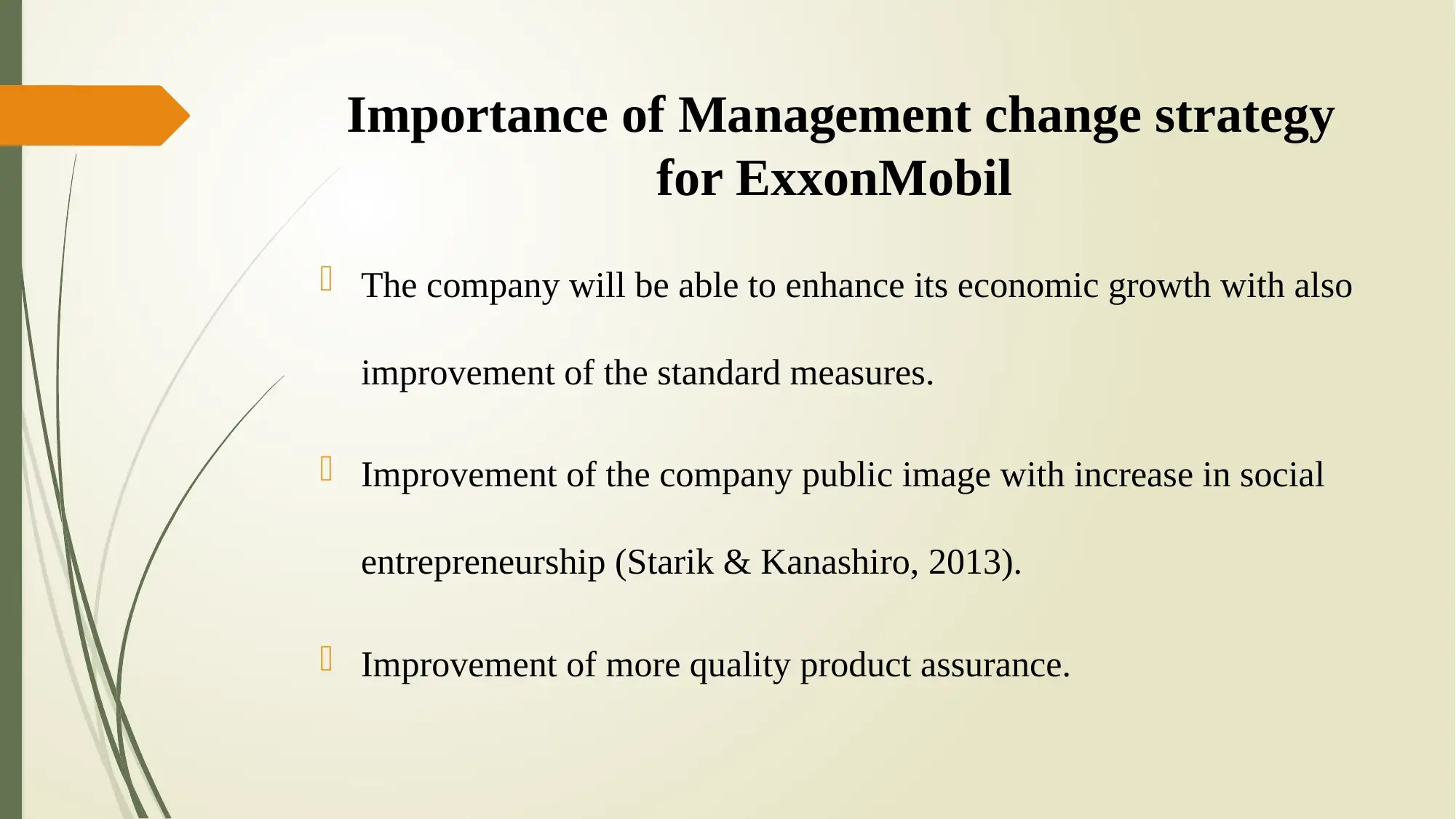
Importance of Management change strategy
for ExxonMobil
The company will be able to enhance its economic growth with also
improvement of the standard measures.
Improvement of the company public image with increase in social
entrepreneurship (Starik & Kanashiro, 2013).
Improvement of more quality product assurance.
for ExxonMobil
The company will be able to enhance its economic growth with also
improvement of the standard measures.
Improvement of the company public image with increase in social
entrepreneurship (Starik & Kanashiro, 2013).
Improvement of more quality product assurance.
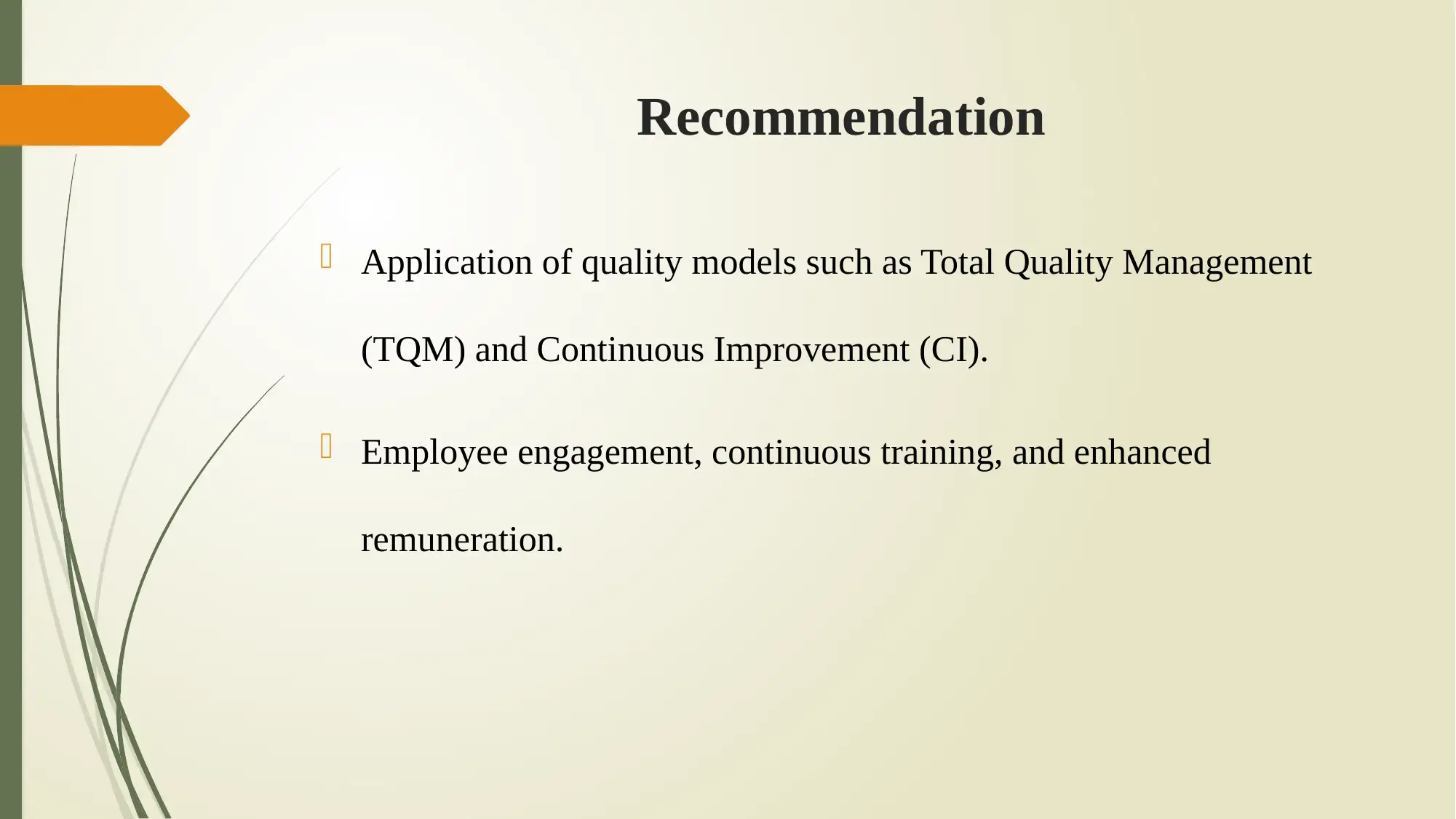
Recommendation
Application of quality models such as Total Quality Management
(TQM) and Continuous Improvement (CI).
Employee engagement, continuous training, and enhanced
remuneration.
Application of quality models such as Total Quality Management
(TQM) and Continuous Improvement (CI).
Employee engagement, continuous training, and enhanced
remuneration.
⊘ This is a preview!⊘
Do you want full access?
Subscribe today to unlock all pages.

Trusted by 1+ million students worldwide
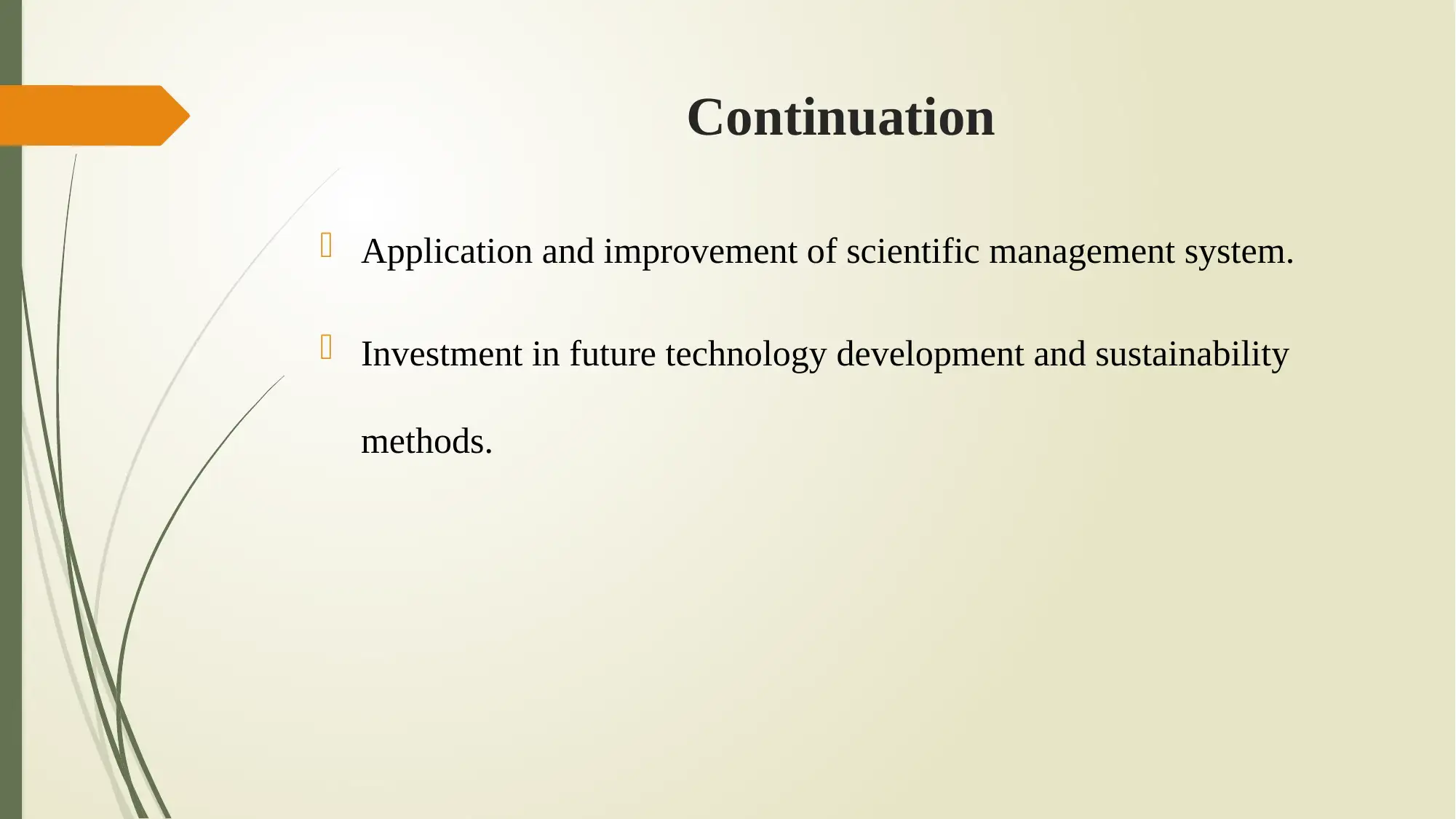
Continuation
Application and improvement of scientific management system.
Investment in future technology development and sustainability
methods.
Application and improvement of scientific management system.
Investment in future technology development and sustainability
methods.
Paraphrase This Document
Need a fresh take? Get an instant paraphrase of this document with our AI Paraphraser
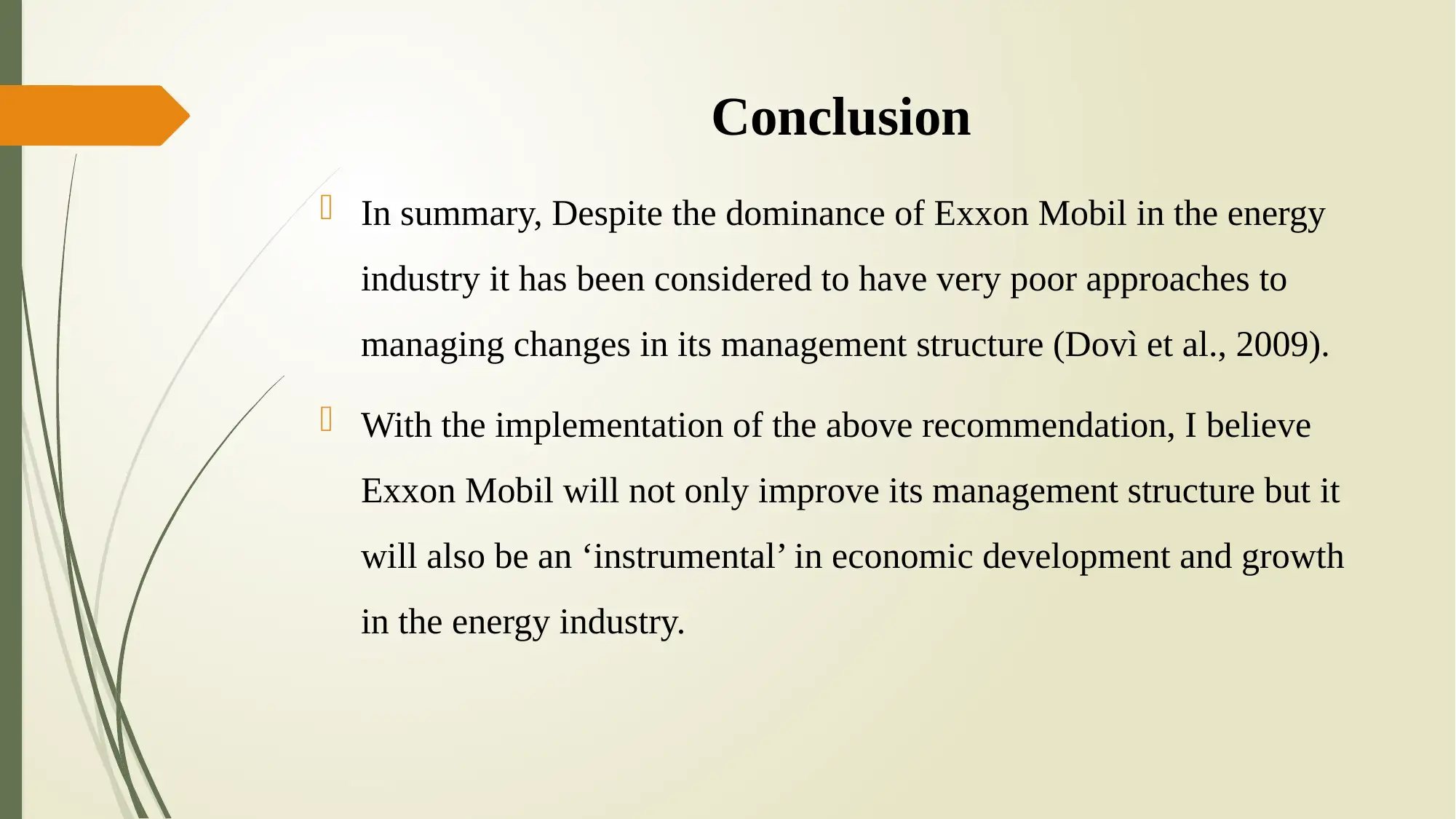
Conclusion
In summary, Despite the dominance of Exxon Mobil in the energy
industry it has been considered to have very poor approaches to
managing changes in its management structure (Dovì et al., 2009).
With the implementation of the above recommendation, I believe
Exxon Mobil will not only improve its management structure but it
will also be an ‘instrumental’ in economic development and growth
in the energy industry.
In summary, Despite the dominance of Exxon Mobil in the energy
industry it has been considered to have very poor approaches to
managing changes in its management structure (Dovì et al., 2009).
With the implementation of the above recommendation, I believe
Exxon Mobil will not only improve its management structure but it
will also be an ‘instrumental’ in economic development and growth
in the energy industry.
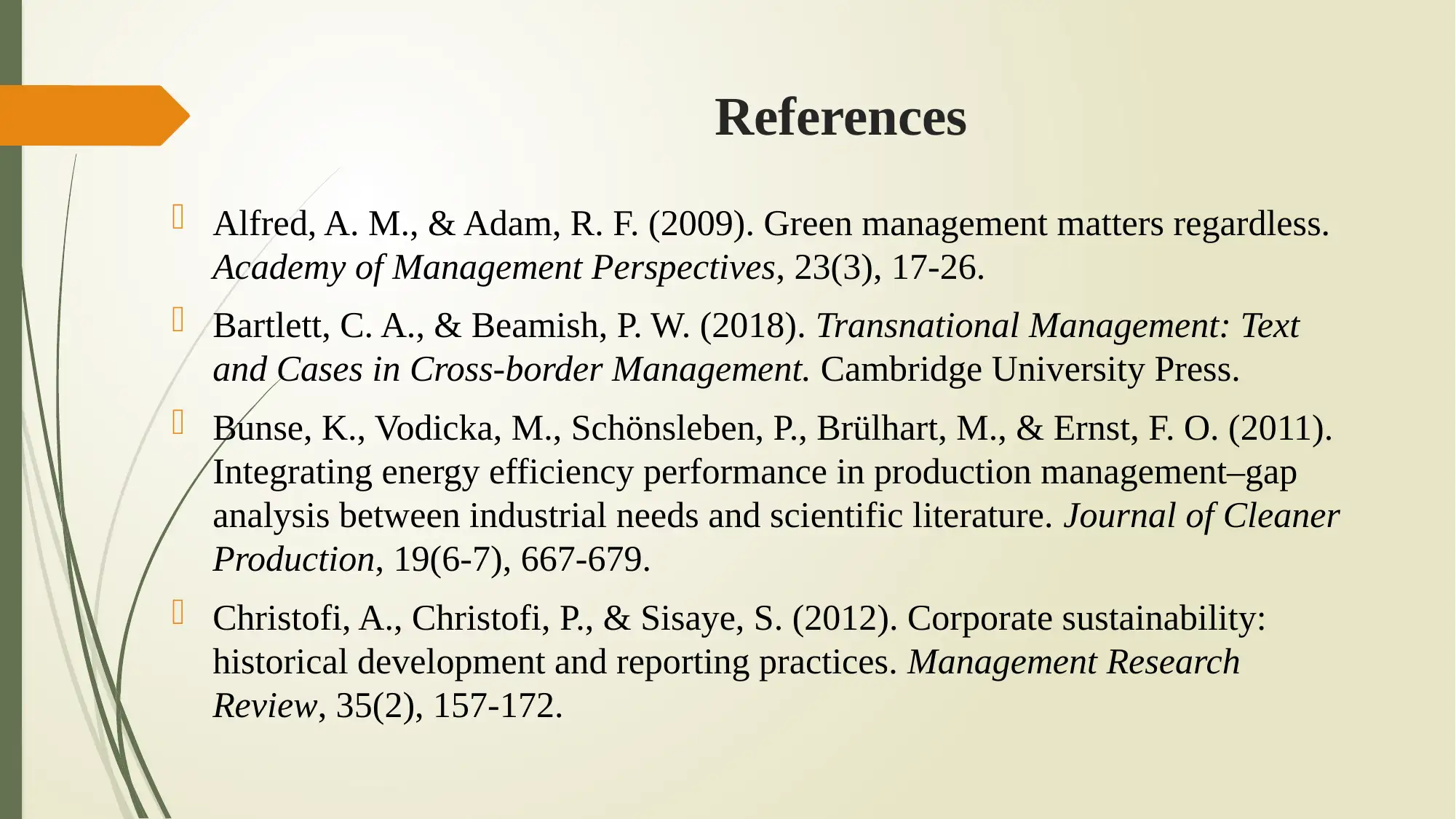
References
Alfred, A. M., & Adam, R. F. (2009). Green management matters regardless.
Academy of Management Perspectives, 23(3), 17-26.
Bartlett, C. A., & Beamish, P. W. (2018). Transnational Management: Text
and Cases in Cross-border Management. Cambridge University Press.
Bunse, K., Vodicka, M., Schönsleben, P., Brülhart, M., & Ernst, F. O. (2011).
Integrating energy efficiency performance in production management–gap
analysis between industrial needs and scientific literature. Journal of Cleaner
Production, 19(6-7), 667-679.
Christofi, A., Christofi, P., & Sisaye, S. (2012). Corporate sustainability:
historical development and reporting practices. Management Research
Review, 35(2), 157-172.
Alfred, A. M., & Adam, R. F. (2009). Green management matters regardless.
Academy of Management Perspectives, 23(3), 17-26.
Bartlett, C. A., & Beamish, P. W. (2018). Transnational Management: Text
and Cases in Cross-border Management. Cambridge University Press.
Bunse, K., Vodicka, M., Schönsleben, P., Brülhart, M., & Ernst, F. O. (2011).
Integrating energy efficiency performance in production management–gap
analysis between industrial needs and scientific literature. Journal of Cleaner
Production, 19(6-7), 667-679.
Christofi, A., Christofi, P., & Sisaye, S. (2012). Corporate sustainability:
historical development and reporting practices. Management Research
Review, 35(2), 157-172.
⊘ This is a preview!⊘
Do you want full access?
Subscribe today to unlock all pages.

Trusted by 1+ million students worldwide
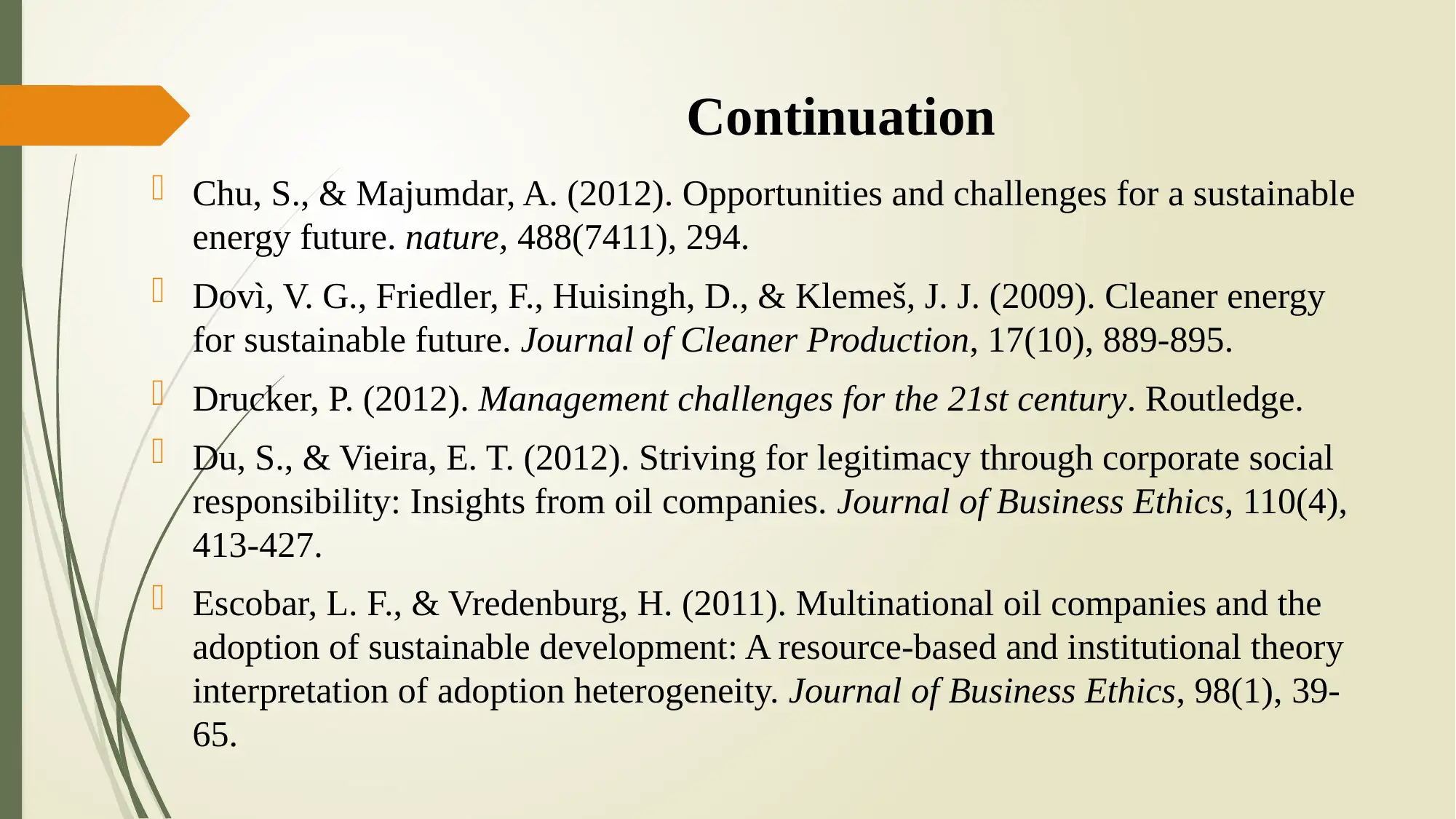
Continuation
Chu, S., & Majumdar, A. (2012). Opportunities and challenges for a sustainable
energy future. nature, 488(7411), 294.
Dovì, V. G., Friedler, F., Huisingh, D., & Klemeš, J. J. (2009). Cleaner energy
for sustainable future. Journal of Cleaner Production, 17(10), 889-895.
Drucker, P. (2012). Management challenges for the 21st century. Routledge.
Du, S., & Vieira, E. T. (2012). Striving for legitimacy through corporate social
responsibility: Insights from oil companies. Journal of Business Ethics, 110(4),
413-427.
Escobar, L. F., & Vredenburg, H. (2011). Multinational oil companies and the
adoption of sustainable development: A resource-based and institutional theory
interpretation of adoption heterogeneity. Journal of Business Ethics, 98(1), 39-
65.
Chu, S., & Majumdar, A. (2012). Opportunities and challenges for a sustainable
energy future. nature, 488(7411), 294.
Dovì, V. G., Friedler, F., Huisingh, D., & Klemeš, J. J. (2009). Cleaner energy
for sustainable future. Journal of Cleaner Production, 17(10), 889-895.
Drucker, P. (2012). Management challenges for the 21st century. Routledge.
Du, S., & Vieira, E. T. (2012). Striving for legitimacy through corporate social
responsibility: Insights from oil companies. Journal of Business Ethics, 110(4),
413-427.
Escobar, L. F., & Vredenburg, H. (2011). Multinational oil companies and the
adoption of sustainable development: A resource-based and institutional theory
interpretation of adoption heterogeneity. Journal of Business Ethics, 98(1), 39-
65.
Paraphrase This Document
Need a fresh take? Get an instant paraphrase of this document with our AI Paraphraser
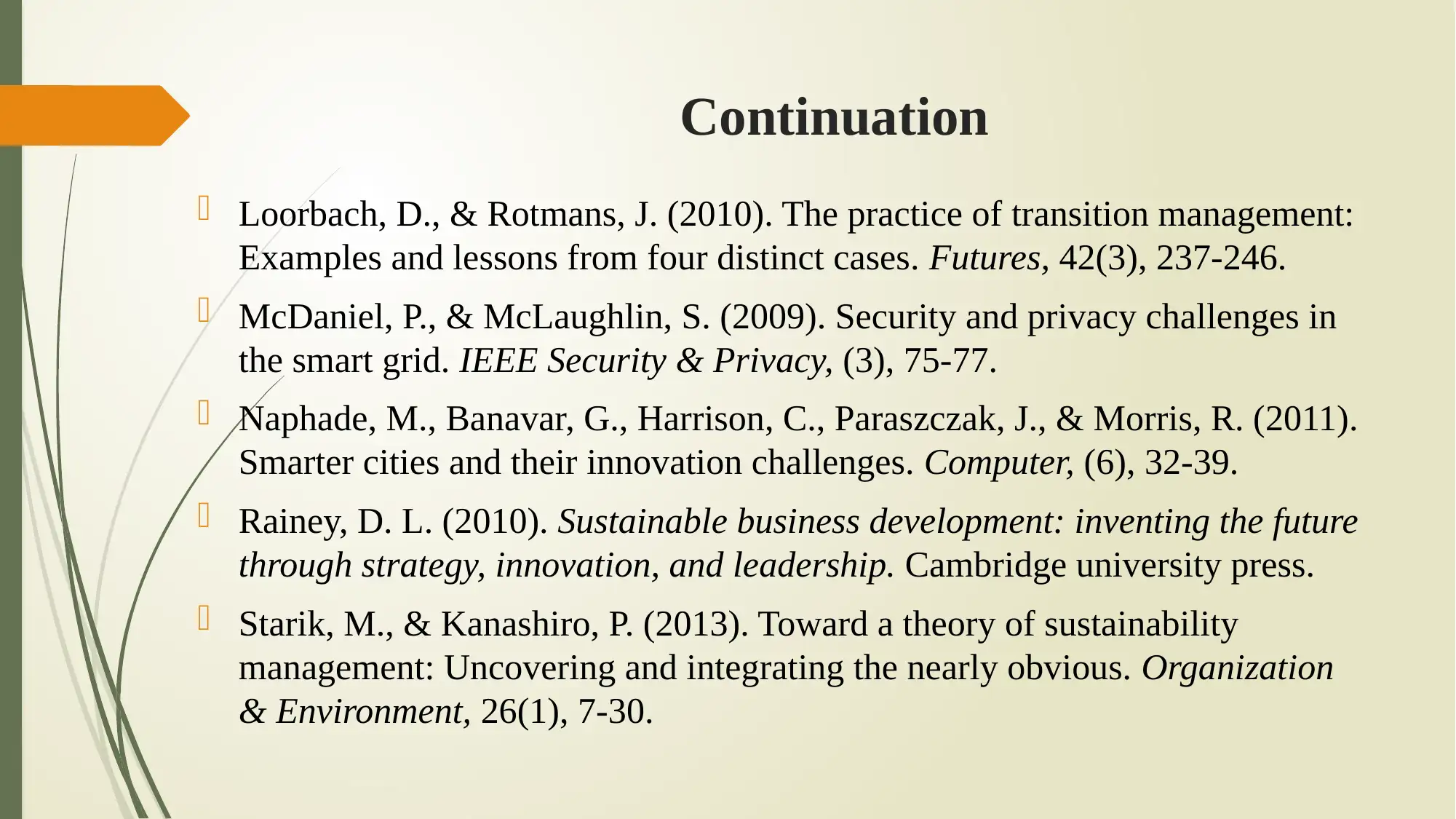
Continuation
Loorbach, D., & Rotmans, J. (2010). The practice of transition management:
Examples and lessons from four distinct cases. Futures, 42(3), 237-246.
McDaniel, P., & McLaughlin, S. (2009). Security and privacy challenges in
the smart grid. IEEE Security & Privacy, (3), 75-77.
Naphade, M., Banavar, G., Harrison, C., Paraszczak, J., & Morris, R. (2011).
Smarter cities and their innovation challenges. Computer, (6), 32-39.
Rainey, D. L. (2010). Sustainable business development: inventing the future
through strategy, innovation, and leadership. Cambridge university press.
Starik, M., & Kanashiro, P. (2013). Toward a theory of sustainability
management: Uncovering and integrating the nearly obvious. Organization
& Environment, 26(1), 7-30.
Loorbach, D., & Rotmans, J. (2010). The practice of transition management:
Examples and lessons from four distinct cases. Futures, 42(3), 237-246.
McDaniel, P., & McLaughlin, S. (2009). Security and privacy challenges in
the smart grid. IEEE Security & Privacy, (3), 75-77.
Naphade, M., Banavar, G., Harrison, C., Paraszczak, J., & Morris, R. (2011).
Smarter cities and their innovation challenges. Computer, (6), 32-39.
Rainey, D. L. (2010). Sustainable business development: inventing the future
through strategy, innovation, and leadership. Cambridge university press.
Starik, M., & Kanashiro, P. (2013). Toward a theory of sustainability
management: Uncovering and integrating the nearly obvious. Organization
& Environment, 26(1), 7-30.
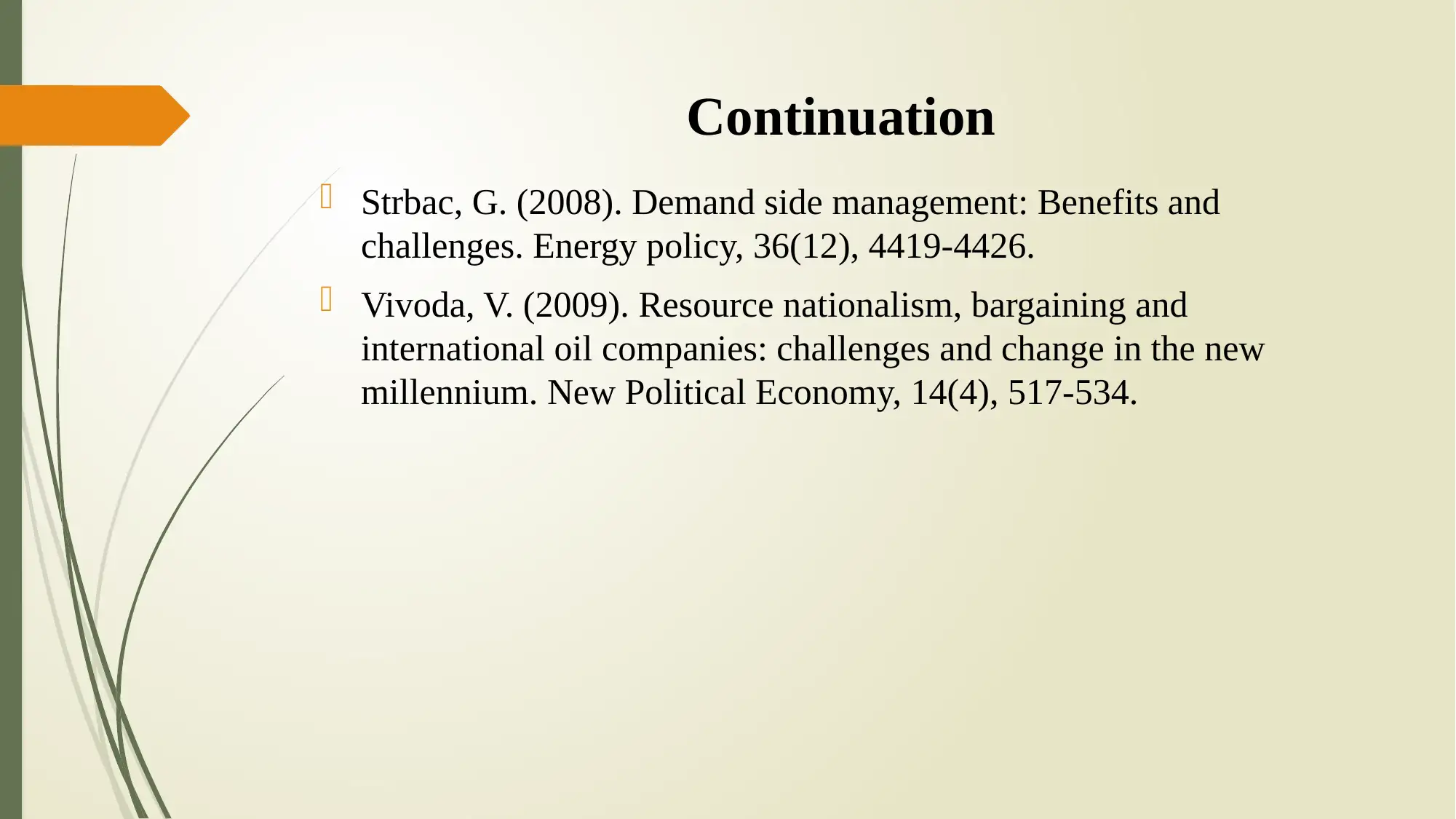
Continuation
Strbac, G. (2008). Demand side management: Benefits and
challenges. Energy policy, 36(12), 4419-4426.
Vivoda, V. (2009). Resource nationalism, bargaining and
international oil companies: challenges and change in the new
millennium. New Political Economy, 14(4), 517-534.
Strbac, G. (2008). Demand side management: Benefits and
challenges. Energy policy, 36(12), 4419-4426.
Vivoda, V. (2009). Resource nationalism, bargaining and
international oil companies: challenges and change in the new
millennium. New Political Economy, 14(4), 517-534.
⊘ This is a preview!⊘
Do you want full access?
Subscribe today to unlock all pages.

Trusted by 1+ million students worldwide
1 out of 15
Related Documents
Your All-in-One AI-Powered Toolkit for Academic Success.
+13062052269
info@desklib.com
Available 24*7 on WhatsApp / Email
![[object Object]](/_next/static/media/star-bottom.7253800d.svg)
Unlock your academic potential
© 2024 | Zucol Services PVT LTD | All rights reserved.




